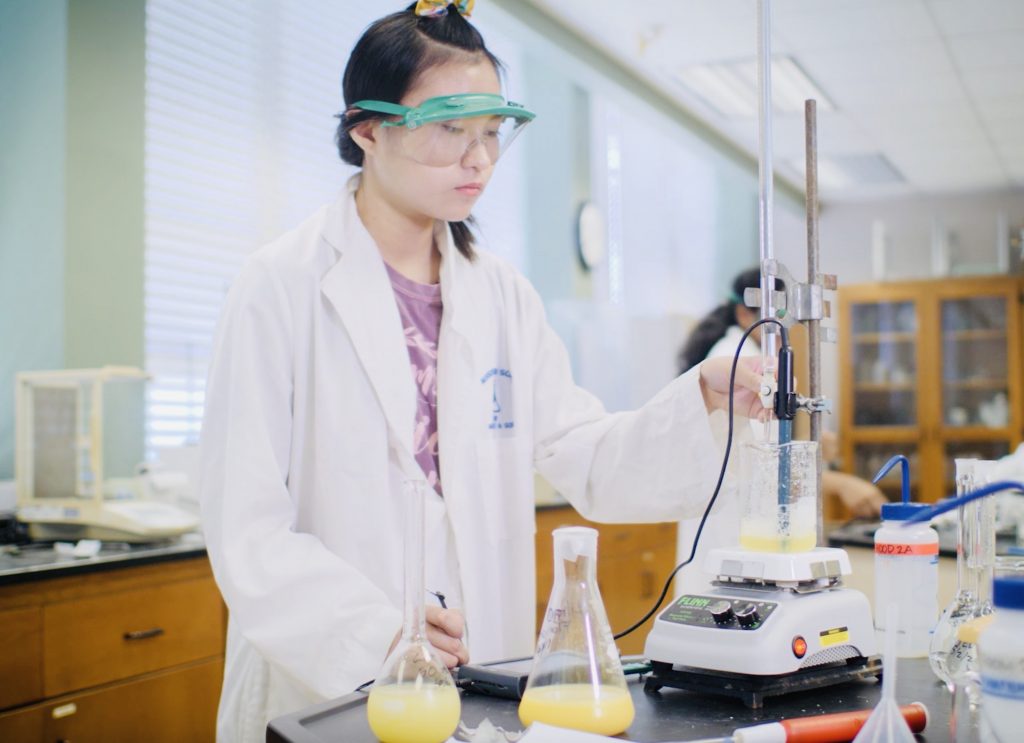Chemistry
The purpose of the science department at The Mississippi School for Mathematics and Science is to give students a broad overview of the sciences and to make them scientifically literate in each of the major subject areas: biology, chemistry, and physics. Emphasis is placed on mastery of basic concepts and laboratory skills through course lectures and discussions, laboratory investigations, field trips, tours, special projects, guest lecturers, and direct involvement with researchers at the college level. Students are given the opportunity to pursue their particular interests through elective courses and independent research.
Requirements for graduation
All students are required to successfully complete one full year of chemistry for 1 CU (two semesters) at MSMS. Students will complete either the two semester sequence of Advanced Chemistry I (1⁄2 CU) and Advanced Chemistry II (1⁄2 CU) or AP® Chemistry (1 CU) to fulfill the requirement.

Requirements for graduation with concentration in chemistry
The Concentration in Chemistry is designed for students who pursue an advanced plan of study in chemistry while attending MSMS. The Concentration in Chemistry helps colleges identify MSMS graduates with advanced preparation in chemistry and who might benefit from placement in higher level coursework at the college level. Students who shall have completed 2.5 approved chemistry Carnegie Units with a B-average in each course or higher while attending MSMS shall qualify. The Chemistry Department and Director for Academic Affairs shall determine which courses meet approval. The Concentration in Chemistry is awarded to qualified students whose applications are approved by the Director for Academic Affairs. The approved courses for the Concentration in Chemistry shall include:
- 1.0 Carnegie Unit AP® Chemistry
- Additional 1.5 Carnegie Units (three semesters), which must include three of the following courses: Organic Chemistry (0.5 CU), Introduction to Biochemistry (0.5 CU), Analytical Chemistry (0.5 CU), Physical Chemistry (0.5 CU).
Other course work may not be substituted. Students applying for the recognition and who meet the approved criteria will be awarded a seal on the MSMS Diploma indicating successful completion of the Concentration in Chemistry, and the final MSMS transcript will reflect Graduation with the Concentration in Chemistry.
Courses offered
Advanced Chemistry I is an in-depth study of the skills and theoretical frameworks of chemistry. Measurement, atomic and molecular structure, stoichiometry, bonding, periodicity and the periodic table, and nomenclature will be studied with an emphasis on the mathematics of chemistry including dimensional analysis and problem solving.
Advanced Chemistry II studies the types of and laws governing the reactions of matter. In particular, students will study solubility and precipitation, gases and gas laws, acids and bases, intermolecular forces, solution chemistry, and a brief introduction to chemical kinetics and thermodynamics.
This course provides an in-depth study of the principles of modern chemistry and should prepare the student for the AP® exam in chemistry. This course requires several hours of study time beyond that required in other courses as well as a laboratory assignment for each week.
This course is designed to lay the groundwork for future study in chemistry by familiarizing the student with fundamentals of chemistry including naming of chemical species, stoichiometry, and atomic structure in addition to problem-solving. The lab experience will reinforce topics covered in class.
This course is a continuation of SC 358 and must be taken the same year as SC358. The course continues the exploration of chemistry fundamentals with kinetics, equilibrium, and acid-base chemistry among other topics. The labe experience will reinforce topics covered in class.
This course is a senior level course designed to be an introduction to the basic principles of organic chemistry. Topics to be covered include nomenclature, elementary reactions of functional groups, stereochemistry, and isomerism.
This is a senior-level course designed as an intensive survey of biological molecules-proteins, nucleic acids, lipids and carbohydrates and their interactions from a cellular level to an atomic description. The major emphasis will be on proteins, but a portion of the course will also be dedicated to nucleic acid, lipid and carbohydrate structure, and metabolism.
This course is designed to introduce the student to the methods used in the quantitative analysis of chemical compounds. This includes classical gravimetric and volumetric methods as well as modern methods such as spectrometry and chromatography. The course also includes a brief overview of statistical methods used in data analysis. The class is primarily lab-based, but does include some out-of-class work.
This course is designed to give the student an opportunity for individualized learning in chemistry. The student will select faculty advisors and with their help, choose a particular problem of interest in chemistry and pursue the problem.
